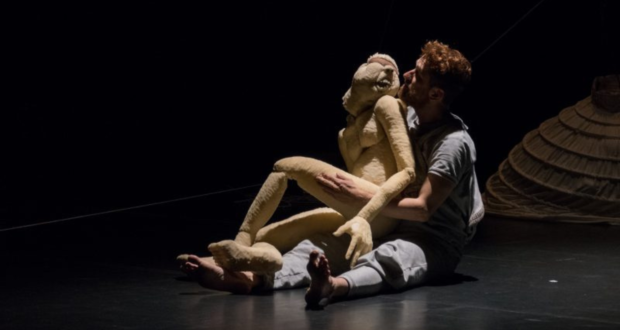An imaginative, humorous and deeply moving healing process, performed with glorious puppetry and dance.Summary
Rating
Excellent
Have you ever felt the need to take hold of a horrible disability, wrap it warmly in your arms and dance intimately with it as you seek understanding and healing? This unique production will make you want to do just that.
As a child, Duda Paiva suffered from an illness that left his body blistered and his eyes sightless. His surreal solo performance, Blind, invites the audience to learn about his experience, using powerful physical movement and breath-taking puppetry to explore understandings of disability in a tenderly inclusive way.
From the stage, anchored ropes ascend then return to the floor, where they attach to three large crinoline shapes. Some of the audience are invited to sit at the sides, and Paiva welcomes them affably. His costume bulges with outsized, disfiguring lumps, and his eyes are covered by enormous steampunk glasses: their extremity emphasises ideas of repugnance and the rejection connected with disability. In a bizarrely amusing turn, audience members are asked to scratch his itchy lumps for him, and human intimacy is created. Suddenly a loud cracking signals an exploding lightbulb and glass falls to the stage: intentional or not? Whatever the case, this putting out of the light is a metaphor for his unexpected blindness. The glass is cleared and we are left together in a waiting room, waiting to meet a healer and be healed.
The production is grotesquely beautiful and surreal as it discloses the inescapably intertwined partnership between the disabled person, the horrific disability, but also the onlooker. We’re immersed in Paiva’s experience through elegant, balletic movement and innovative, arresting visuals. A crinoline becomes a lamp, an embryo within, with shadow play connecting Paiva to the being. Suddenly this object transforms into the healer, a striking, bare-breasted shaman puppet, drawn from Brazilian culture. Wonderfully created by Evandro Serodio and Paiva, she comes alive through piercing eyes and quivering foam fingers, and Paiva thrillingly dances with her, seeking healing. Further puppets are then viscerally birthed from his costumed tumours and grow to become vital beings in their own right.
The puppetry is stunning, both startling and deeply moving as it describes opposing tensions surrounding disability. One of the puppets poignantly describes Paiva as “Mother”. But the onlooker too is recognised as part of Paiva’s traumatic experience: a spectator literally left holding the ‘baby’ of the disease must engage with it. The puppets, like these relationships, are tensed, sometimes an unwanted shadow attached at the performer’s toes, elsewhere stretching up high or stamped into the ground.
There are multiple exquisite elements in this piece: the puppetry, the dance, and the laughter most prominent. But just as blindness might cause you to draw on other senses, the use of sound is also impressively resonant here, offering moments of emotive beauty where ropes are played like harp strings, or voices stirringly engulf the space.
The audience is integral as the narrative transforms from a memory into an experiential spectacle. We are touched by the telling, the puppetry and the performer. Boundaries break as Paiva and the puppets reach out from the stage to share and offer understanding. Post-show we are invited to handle the puppets, a hands-on interaction where we willingly redescribe our relationship with the disabled, encountering the person, the incapacity and our own perceptions in new ways
Blind is a magnificent, moving work that enables engagement with the ugliness of disability through finding beauty in the pain of the performer. It is empowering for everyone involved. You will want to touch it, to dance with it, and recognise it, and will perhaps leave the theatre a slightly different person.
Concept by: Duda Paiva, Nancy Black
Directed by: Nancy Black
Choreography by: Duda Paiva
Music/Sound Design by: Wilco Alkema
Lighting Design by: Mark Verhoef
Puppets designed by: Evandro Serodio, Duda Paiva
Produced by: Duda Paiva Company
Blind plays at The Coronet Theatre until 11 March. Further information and tickets here.
 Everything Theatre Reviews, interviews and news for theatre lovers, London and beyond
Everything Theatre Reviews, interviews and news for theatre lovers, London and beyond



